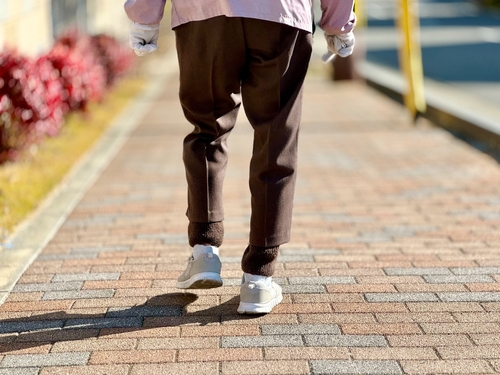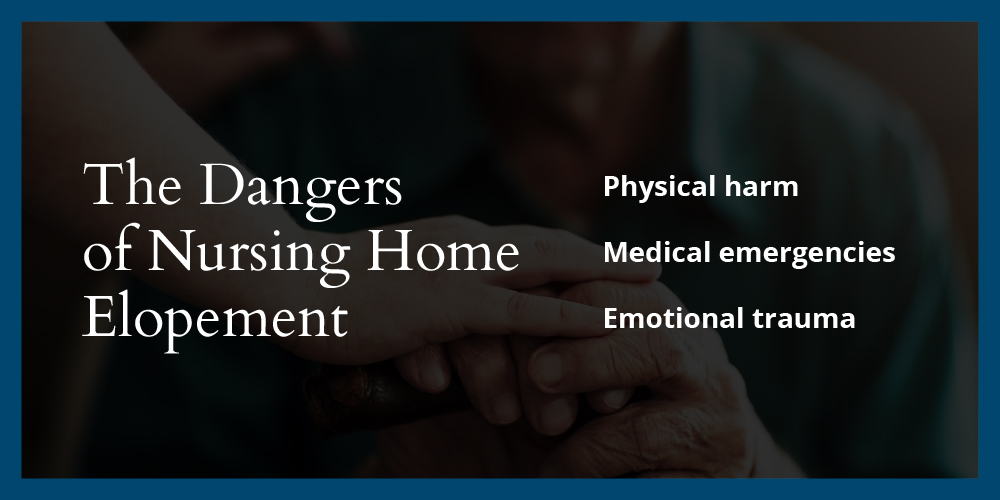
Nursing home elopement is a serious issue that can put vulnerable residents at significant risk. If you have a loved one in a nursing home, understanding what elopement is and how it can be prevented is crucial. If your loved one was already injured in a situation involving elopement and you are seeking legal guidance, a trusted Illinois nursing home neglect attorney can help you through this difficult situation.
At Nursing Home Injury Center, we stand as proud advocates for nursing home residents and their families. We can help you file a claim against negligent nursing facilities that allow elopement to occur. When you work with our firm, we will do everything we can to help you get compensation for your loved one’s damages.
What Does Nursing Home Elopement Mean?
Nursing home elopement occurs when a resident leaves the facility without staff knowledge or permission. This can be particularly dangerous for residents with cognitive impairments, such as dementia or Alzheimer’s disease, as such conditions can make residents confused and unable to find their way back to the facility. Elopement can lead to serious injury or death if the resident is not found and returned quickly.
Wandering poses a similar risk to a resident’s health. The only difference between wandering and elopement is that wandering occurs when a resident walks around a nursing home unsupervised, leading to potential injuries, and elopement is when a resident leaves the facilities altogether.
Why Does Elopement Happen?
There are several reasons why nursing home elopement might occur:
- Cognitive impairment: Residents with conditions like dementia can become confused and wander off.
- Emotional distress: Feelings of anxiety, depression, or loneliness can spur a resident to leave the facility.
- Lack of supervision: Insufficient staffing or inattentive caregivers can result in residents leaving unnoticed.
- Desire for independence: Some residents may feel a strong urge to regain their freedom and leave on their own.
Understanding these triggers can help in finding ways to prevent elopement.

The Dangers of Nursing Home Elopement
When a resident elopes, several risks are involved:
- Physical harm: Wandering off can lead to accidents like falls, traffic incidents, or exposure to harsh weather conditions.
- Medical emergencies: Residents may miss important medications or medical treatments, worsening their health.
- Emotional trauma: Elopement can cause significant distress and anxiety for both the resident and the resident’s family.
These dangers highlight the critical need for proper monitoring and care in nursing homes. Elopement at nursing homes is often the result of understaffing, as the facility may lack the resources to properly watch over their residents.
Injuries From Nursing Home Elopement
If a nursing home resident is left to his or her own devices for even a short while, the risk of injury increases. Just a few hours of elopement can be disastrous for the resident’s health, with adverse outcomes such as:
- Fractures and breaks: One bad fall can result in multiple broken bones. If the resident lands on his or her back, it could cause a spinal cord injury.
- Sickness: Cold temperatures can weaken the body’s immune system and reduce its ability to fight infection. A resident who elopes while it is snowing or raining could be left with pneumonia or other serious illnesses.
- Dehydration: When the body loses more liquid than it takes in, dehydration starts to set in. If a resident elopes for an extended amount of time without drinking any water, he or she might be at risk of heat stroke or worse.
Additionally, if a resident has a pre-existing condition like diabetes or heart disease, failure to treat those conditions during an episode of elopement could have disastrous results. At Nursing Home Injury Center, we can obtain medical documents like a physician’s report to understand just how badly your loved one was hurt.
Wrongful Death in Nursing Home Elopement
In extreme cases, nursing home elopement can result in the death of an elderly resident due to exposure to the elements, a slip-and-fall, or a pedestrian accident. Should the worst come to pass, you can file a wrongful death claim against the nursing home for negligence.
In Illinois, you can benefit from a wrongful death claim if you are the surviving spouse or child of the decedent. Compensation in these claims may account for financial losses like the decedent’s funeral expenses or medical bills, as well as emotional damages related to grief or a loss of companionship. At Nursing Home Injury Center, we will take the time to calculate your damages so that we can advocate for the full value of your claim.
How to Prevent Nursing Home Elopement
Preventing elopement requires a combined effort from both family members and nursing home staff. Here are some strategies:
- Regular assessments: Conduct regular assessments to identify residents at risk of elopement.
- Staff training: Ensure all staff members are trained to recognize and manage potential elopement behaviors.
- Security measures: Install alarms, locks, and surveillance systems to monitor exits and entrances.
- Personalized care plans: Develop individual care plans that address each resident’s specific needs and triggers.
How Can I Take Legal Action Against a Nursing Home?
As a private citizen, you may feel powerless to do anything about the negligence of nursing home staff. However, you can take steps to help build a case for a nursing home elopement claim.
When visiting your loved one in a nursing home, document everything, even if it does not seem important. Statements from your loved one, other residents, or staff who are willing to speak to you can serve as important testimony. Taking pictures of the injuries caused by the elopement can also provide you with concrete evidence.
Keep in mind, you only have two years from the date of an injury to file a claim in Illinois, so the sooner you act, the better. A nursing home neglect attorney at Nursing Home Injury Center can launch a full investigation into the facility, obtaining evidence that may be out of your reach, such as treatment plans or state inspection records.
Contact Our Peoria, IL Nursing Home Elopement Attorney
Nursing home elopement is a pressing issue that requires attention and action from both families and nursing home staff. If your loved one was involved in an incident involving nursing home elopement, it is crucial to obtain legal representation. Contact the Peoria County, IL nursing home neglect lawyers with Nursing Home Injury Center. Call 309-524-6900 for a free consultation.



